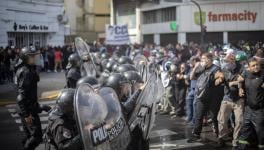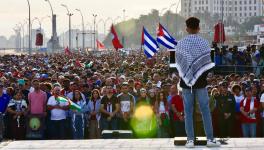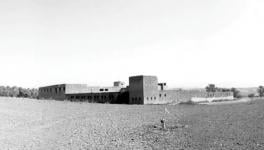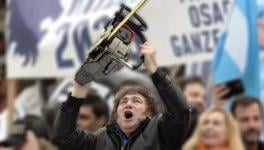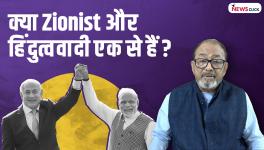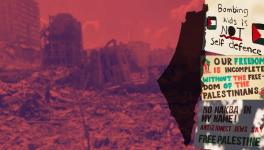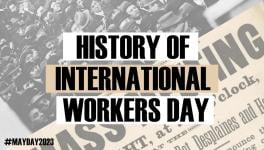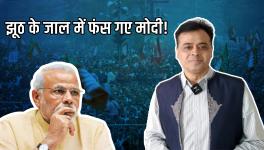‘Without Struggle, There is no Victory’

João Pedro Stedile, national leader of the MST. Photo: ALBA-TCP
The Latin American left is not in a position to face the capitalist crisis and is in debt in the sense of discovering new forms of struggle to propose structural changes in the masses, assured the leader of the Landless Rural Workers’ Movement (MST) of Brazil, João Pedro Stédile.
In an interview with the pan-Arab channel Al Mayadeen, the economist and popular leader, addressed the scenario of the left in Brazil, the need for international coordination in defense of just causes and in the struggle against imperialism.
The social defender insisted on the urgency of unity of the entire world working class to confront capitalist globalization and the presence of transnational companies.
A faithful follower of the left-wing revolutionary processes in Cuba, Nicaragua, Venezuela and of south-south cooperation, Stédile also addressed the internal scenario of Brazil, the management of President Luiz Inácio Lula da Silva and support for the cause of the Palestinian people.
Al Mayadeen: How do you assess the position of President Luiz Inácio Lula da Silva and the Brazilian left on the political scene in America and internationally?
João Pedro Stédile: Lula faced heavy persecution in the past. They put him in jail, they prevented him from running for office, but we managed to get him out of jail, and our movement played an important role, because we staged a vigil for 580 days, camped in front of the jail.
And after he was released, conditions were created in Brazil to generate a broad front that managed to defeat fascism and elect him president. And for that, Lula was very important, because he was the only candidate who had enough strength to defeat the extreme right, and we still only won by two points.
But it turns out that it was also a broad front government, with many forces of the bourgeoisie, of the right, and progressive left forces. So, that is Lula’s Government, of class composition.
On the other hand, the Government assumed a completely dilapidated State, because modern fascists want the minimum State, they are not interested in a strong state, because their entire policy is to favor transnational companies. Those were the companies that financed the coup against Dilma Rousseff and later imposed the Government of Jair Bolsonaro. Just as it was the American, Israeli companies and the Mossad, who put Javier Milei in Argentina.
So, that is the nature of the Lula Government, you can’t expect much. Furthermore, in these coalitions, the capitalist crisis continues and also affects Brazil, and the Lula Government of that nature fails to have a project for the country, a program that can point to the future.
The policies that Lula is promoting in this year and a half are still insufficient and do not lift workers out of poverty, they do not combat social inequality, and that is why we continue with 30 million Brazilians going hungry and another 70 million who do not have work, stable income, or labor rights.
So, the situation in Brazil is very difficult.
In Brazil, we all know that President Lula never assumed himself to be a man of the left in the sense of being anti-imperialist and anti-capitalist, he is a humanist and a trade unionist.
Of course, he has a social sensitivity of wanting to help the poor, but it is not enough to love, you have to create conditions, accumulate strength and, above all, motivate people to organize to fight.
Now, on our side, on the left in Brazil, we have a very complex situation. The institutional left that is in parties and even participates in Lula’s Government, are held hostage by electoral logic, they only put their energy into electing deputies, for that institutional life.
The leftist parties in Brazil stopped putting energy, resources, the political will to organize the working class and the social struggle, and those who continue to do so are the popular and union movements, which are part of the left in the generic sense, but they are not the main political forces in the country.
And here the main challenge is that as we suffered a very big defeat with the advent of the crisis of capitalism in 2014, then Lula’s prison, the coup against Dilma, the rise of Bolsonaro, the COVID-19 genocide, which took the lives of almost a million Brazilians; All of this affected the working class.
Today we are in a historical period of decline in the mass movement, and that has an impact, because when the masses do not fight, there is no change in the correlation of forces. Our position as a movement, more than anything, is to put energy into organizing people and social struggle, so that this is like a permanent process of accumulation of forces.
So, our position as a movement, more than anything, is to put energy into organizing the people, into organizing the social struggle, so that this is like a permanent process of accumulation of forces, which in the medium term results in the resurgence of the movement more, which is the only thing that can discuss a country project, pull the Government to the left and in fact, accelerate the processes of changes that lead to the improvement of the living conditions of the people.
AM: What is the state of the working class in Brazil?
JPS: In Brazil we have, of the total population, 140 million workers, half of them have a job, are minimally organized in unions or in some way, at least they have labor rights. But, there are another 70 million who are on the streets, who are abandoned, who do not have a stable job, who do not have a fixed income, and that part is abandoned even by the left. We don’t know how to organize them, the only thing we know is that they live on the outskirts of the city, that the majority are young, that the majority are women, that the majority are Black, and that they suffer all types of repression from the State.
Of course, we have a very large deficit, the sector of the people that are organized and have class consciousness is very small. For example, even of the 70 million who have jobs and are formalized, only nine percent are unionized, so this generates a low level of critical consciousness and, therefore, a low level of political participation.
AM: What is the state of the left in Latin America?
JPS: To understand the situation in Latin America, we must take a slightly broader, historical look. When there was the crisis in the Soviet Union and the rise of financial capital that globalized and imposed neoliberalism on us in the 90s, a complete dispersion of the left and the living conditions of the working class was generated. We lost 10-15 years there, where we were under permanent defeat.
Neoliberalism did not solve the problems of the people, of the working class, and the problems exacerbated the contradictions. That then made it possible that, at the beginning of the year 2000 with the victory of Commander Hugo Chávez in Venezuela, we managed to win the elections in several countries, but in the majority of the countries that won progressive governments, they were not the result of a rise of the movement of masses, it was much more a reaction against neoliberalism.
From 2000 to 2014 there was a great ideological confrontation in Latin America and that generated a struggle that appeared in the governments and on the left around three projects. The neoliberal project continued to be subordinated to the American empire, where there were some countries with their governments and the left dominated.
Then, there was another sector that was progressive and against neoliberalism, therefore, they were in favor of strengthening the State, but they were not anti-imperialists. And in that period, the countries that stood out with that line were Argentina and Brazil.
And there was a third project, which was the project that Chávez promoted and that, in order to contrast the project of imperialism, of neoliberalism, the FTAA, he named ALBA, and around the ALBA project, with the leadership of Chávez from Venezuela, not only the progressive Government of Bolivia, Ecuador, Venezuela, Nicaragua, Cuba joined, but a great alliance of popular movements was generated, which we even called ALBA Movimientos, which was a way not only to adhere to the ALBA project, but to engage in struggle against the other two.
ALBA was an anti-imperialist project, a project of people’s integration and not just of governments. And also, it was positive that at that time the conditions were generated to produce other platforms of continental integration promoted by Chávez, such as CELAC, which is very important as an institutional platform to oppose the OAS. And also, at the South American level, there was a push for UNASUR as an economic space.
With the capitalist crisis since 2014, with the Venezuelan oil crisis, with the death of Chávez and other difficulties that arose, Latin America, from 2014 until now, is immersed in a crisis, in which none of the three projects constitute a real proposal.
Not even American neoliberalism is a solution to the problems. Neoliberalism now no longer even continues as a project, because the transnationals, faced with the crisis of capitalism, appealed to the fascists of the extreme right, which were not present in the previous period.
The neo-developmental, progressive project, which was Argentina, Chile and Brazil, also entered into crisis. Hence, what I explained before, any change in Lula’s government is very difficult. So, the same project that wants to be anti-neoliberal, but does not want to be anti-imperialist, is in crisis. Perhaps Mexico still maintains a certain viability as a project.
The ALBA project also, unfortunately, entered into crisis, because the countries do not have resources, because it did not manage to expand its political base and the same four or five original countries remained and only the Caribbean islands were added, which make up 10 countries, but in Latin America we are 34.
The ALBA Project is also in a period of decline, and all this analysis that I am doing leads us to read the reality, that since there is no economic solution and there is no clear economic project, neither for the bourgeoisie subordinated to the gringos, nor for the working class, what we know is that Latin America will continue, perhaps for 10, 15 years, with a historical period of great political instability, where anything can happen in the space of governments. And that is why sometimes a progressive government is elected, and since it does not make policies in favor of the people, then the extreme right comes, like what happened in Brazil, like what happened in Argentina, like what happened in Peru, like what happened in Ecuador.
The scenario of the left in Latin America follows more or less the same pattern as Brazil. The Latin American left is very weak in terms of a program to confront the capitalist crisis, because now is the time to present an anti-capitalist program. The title does not matter, if it is socialism, if it is popular…, but it has to be anti-capitalist, capitalism is not going to solve the problem of the masses.
The left in Latin America, with rare exceptions of some parties, I say left as a popular force that organizes itself in various ways, is indebted to building a program that faces the capitalist crisis, that proposes structural changes for the masses.
The left has the debt, the task to discover new forms of struggle, new forms of people’s organization, especially in those two sectors that I referred to before, the workers of the periphery and the youth. It is still very trapped in the institutionality, with the elections, and it may take a while until the mass mobilization also moves the left and then a new generation of leftists emerges, of fighters, with other practices, another vision of the world and a new soul.
AM: What role do the elite of intellectuals, journalists, thinkers, philosophers, politicians and leaders play in this scenario of left-wing crisis?
JPS: The problem of intellectuals in Latin America, generally, in generic terms, is that this sector, which in reality are petty bourgeois who live around the university, around the media or institutions, were co-opted by neoliberalism, not as an ideology, as a project, but because of customs.
The guys became very individualistic, they only think about their careers, very consumerist and they abandoned social political practice. But it is true, there are many brave intellectuals who remain organic and, therefore, reflect from leftist organizations and the working class in general, but they are a minority. Much worse than in some other times when there was a more important presence of organic intellectuals. Today we almost do not have organic intellectuals, we have intellectuals.
AM: In the midst of Israeli aggression against the Gaza Strip and demands for a Palestinian state. How is the Palestinian cause seen in Brazil?
JPS: We were formed ideologically by the influence of the Cuban Revolution, its leaders, its thinkers, by the influence of the Nicaraguan Revolution, which was in 1979 and greatly influenced the struggle of all of Latin America. Also at that time there was an ideological influence of liberation theology, which is that Christian aspect that linked the belief, the faith that peasants have through their religious practice, like any people, with the need for liberation.
And that was important, and those currents that I am citing, whether from classical thinkers, whether from leaders like Fidel Castro, Ernesto Che Guevara, or from revolutionary processes like Cuba and Nicaragua, helped us incorporate, from the birth of the movement, the conception of that it is not possible to fight against capitalism, against large estates, against patriarchy, against colonialism, without internationalism.
Internationalism for us is a principle, it is not only the motivation to show solidarity with the people who fight, it is more than that, it is an identity. The entire working class in the world is the same, we only change the passport, our enemies are the same: capitalism.
In times of the globalization of capital, which comes through the dollar, through transnational companies, through financial capital, the working class around the world will not be able to free itself if we do not join forces to confront the same enemy.
Since the beginning of the movement we have that identity with Palestine, with the people of Palestine, because they are in the first trench against Zionist colonialism, against capitalist exploitation, and because in a certain way you fight for the land, for your territory, the Palestinians are the landless of the Middle East, and we in Brazil, who are landless, are the Palestinians of Brazil, because the situation is the same.
We fight for territory, for rights, for popular autonomy, so we always had that sympathy for the struggle of the Palestinian people, and we always, in some way, tried to connect, which is more than support and solidarity.
As MST, we always pressured so that the two organizations that exist in Palestine that involve people from the countryside, whether women or peasants, participate in La Via Campesina, which is our international platform.
We always motivate our base to participate in brigades to harvest olives in the month of October in Palestine. So, we had to campaign because the ticket was expensive, but we have managed to send 20-30 people every two years.
That is a lesson for us. It is not going to harvest olives, it is going to see how the Government of “Israel” behaves, it is going and seeing what the daily struggle of the Palestinians for their resistance is like, and when they return, they are another person, as if they had done a great course of political and personal training and commitment to the Palestinian people.
That is why every time the situation in Palestine intensidies, we try to do something that can symbolize or can be a testimony of our fidelity, our loyalty, our solidarity with the Palestinian people.
But that’s how it is with all people. Now we are very worried and we say: Our Palestine, our Gaza, is Haiti, because the same barbarism that they are imposing in Gaza, they are imposing in Haiti.
Just as we try to denounce in Brazil the repressive hand of the Government of “Israel”, because they continue to sell weapons, above all, weapons of mass repression, which they test against the Palestinians and then take to the periphery of Brazil to shoot at the poor.
There are several weapons there that were sold [to Brazil] by the Israelis, just as it was public and notorious that Mossad and the intelligence services of “Israel” were supporting Bolsonaro from the beginning. It was Mossad who lent Bolsonaro large computers installed in Taiwan or Ireland, from there to use social media without control, and they carried out a true massacre on the unconscious people of Brazil, and managed to win the elections.
They repeated that same tactic now with Milei, clearly linked to Zionism and supported by Mossad. And the same thing happens in other Latin American countries, such as Guatemala, where the Israelis always had a lot of presence underground.
So, we try to use the negative facts of the invisible hand of Mossad and Zionist capital, to show our people that the struggle is international.
AM: What message do you have for the people of Gaza and all the people in Palestine who struggle against zionism?
JPS: Our message, which is not mine, it is from the MST, and we do it in practice, not just in rhetoric, is to tell them that we are with them and that they resist. We know that this costs a lot, many lives, a lot of sacrifice, but there is no other way. Try to resist, and we, from Brazil, what we can do is join in, be it sending food, or doing counter propaganda against zionism. The best way to be in solidarity with the resistance is also to fight in our towns against the companies of “Israel”, against Israeli capital.
For example, in Brazil, the largest company that sells beer is owned by Zionist capital, which is controlled by Banco Safra, which is Zionist. So, we must fight against those Zionist companies that also exploit the Brazilian people.
Comrades, comrades, resist, only one thing is certain, some time may pass, a month, two years, 10 years, but the victory is certain. He who does not fight does not win, and your right and dignity is the security that you will win, and with you all the people who fight will win.
This article was first published in Spanish at Al Mayadeen.
Get the latest reports & analysis with people's perspective on Protests, movements & deep analytical videos, discussions of the current affairs in your Telegram app. Subscribe to NewsClick's Telegram channel & get Real-Time updates on stories, as they get published on our website.









